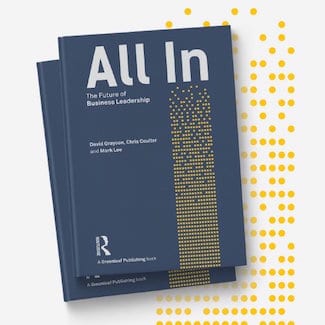How Can Corporations Make the Transition to Sustainability? A Q&A with the Authors of ‘All In’
Global warming. Mass migration. Extreme inequality. That’s just part of a familiar laundry list of global challenges, each of which is huge – and growing. Solving any of them will be difficult. Taken together, they’re likely to overwhelm the best efforts of governments and civil society.
So what’s the solution? To mobilize “the most global set of actors in existence, with both the ability and responsibility to drive greater sustainability across markets and society”: In other words, for-profit business. That’s the position of David Grayson, Chris Coulter and Mark Lee, three leading thinkers in the field of sustainability and the authors of the new book “All In: The Future of Business Leadership.”
But how can massive global corporations make the transition to sustainability – especially when many of their business models currently depend on unsustainable resources or practices? The book explores this and other questions, describing how companies can combine and apply the essential attributes of corporate sustainability leadership – both for the success of their businesses and the survival of the planet. It draws on research involving thousands of experts over two decades, and reveals insights from dozens of interviews with leaders of global companies like 3M, BP, DuPont, Google, GE, Huawei, IKEA, Nestlé, Nike, Patagonia, Shell, Tata, Toyota, Unilever and Walmart.
NextBillion spoke with the three authors via email, and we’ve included their insights in the Q&A below (they collaborated on the answers to each question). If you’d like to read more, the publisher of “All In” is providing our readers with a limited-time 30 percent discount code if you order the book from its website using code: AIL230. And you can read a free chapter of the book if you subscribe to our weekly e-newsletter, NextBillion Notes, in the month of August.
All In Authors: The three of us share a goal that 9-10 billion people will be able to live reasonably well within the constraints of one planet by mid-century. Whilst such sustainable development is a universal challenge in which governments, civil society and citizens all have roles, we are convinced that business leadership is central to developing and maintaining the kind of markets and economies that the environment and society need to thrive.
Today’s multinational businesses have unparalleled scale and reach, touching thousands of suppliers and billions of consumers across hundreds of countries. They are the most global set of actors in existence, with both the ability and responsibility to drive greater sustainability across markets and society. We are convinced that businesses can no longer afford to be diffident or half-hearted about sustainability. They have to go “All In.” We wrote our book to inspire and help businesses to do so. We hope that having read the book, readers will be convinced that businesses do indeed need to go All In on sustainability – and, crucially, that it is both possible and the best route to long-term business success.
JM: What is the GlobeScan-SustainAbility Leaders Survey, and how do you utilize its findings in the book?
AIA: The GlobeScan-SustainAbility Leaders Survey is an annual survey, a joint venture between Chris’s organization, GlobeScan, and Mark’s organization, SustainAbility. Running since 1997, it is one of the oldest, continuously running surveys of its kind – even longer established than ratings like the Dow Jones Sustainability Index and other surveys like the Edelman Trust Barometer, and the same age as the Fortune “World’s Most Admired Companies” ranking. The survey involves a panel of thousands of sustainability experts from business, civil society, media, academia, regulators and government from more than eighty countries. We could not imagine a better base on which to construct a view of what comprises best-in-class corporate sustainability leadership today, and how business will need to stretch its capacities to harmonize commercial success and sustainability performance in the future.
 JM: Talk about some of the companies you profile in “All In” – what can other companies learn from them about how to move their own business models toward sustainability?
JM: Talk about some of the companies you profile in “All In” – what can other companies learn from them about how to move their own business models toward sustainability?
AIA: In the book, we profile the sustainability journeys of businesses that have ranked high in the Leaders Survey. In the process of developing “All In,” we were privileged to interview people running these companies at the time they were ranked highest in the Leaders Survey – companies like IKEA, Nestlé, Nike and Patagonia. Only one business, Interface, has been in the Leaders Survey every year, while Unilever has topped the survey the last eight years – the longest and greatest leadership dominance in the survey’s history. We include extended case-studies on both these businesses in “All In.”
From all the businesses we have looked at, we have concluded that there are five critical, interlinking attributes that businesses need: Purpose, Plan, Culture, Collaboration and Advocacy.
Going All In means having a clear Purpose, which is authentic and inspiring, and explains why the business exists and how it creates value for itself and for society. It is about having a comprehensive Plan which minimises negative social, environmental and economic (SEE) impacts and maximises positive SEE impacts; covers all aspects of the business, and extends into the supply chain. Going All In means having a sustainable Culture which is innovative, empowering, engaging, open and transparent, with a core sense of ethics and responsibility. “All In” businesses have the skill and will to engage in Collaboration extensively with a range of business, civil society and public sector partners; and they undertake Advocacy, speaking out and speaking up for social justice and sustainable development.
JM: The book mentions how BP and Shell often ranked highly in the Leaders Survey in past years: How can companies that depend on unsustainable resources (e.g. petroleum) or business practices (e.g. extremely low-wage labor) move toward greater sustainability? Would true sustainability require them to either close up shop or entirely recreate their business models?
AIA: Having the 20 years of GlobeScan-SustainAbility Leaders Survey is fantastically useful because, in a field with relatively limited longitudinal data, it shows how society and experts’ views of what it takes to be a sustainable business have evolved greatly. The performance bar is far higher today than in 1997 when the survey began. As the world has moved from a “do no harm” era through a “strategic integration” era and now to a “purpose-driven” era, the need for new business models has grown. We expect that this need will grow, and that pressures for regenerative, net positive business models like circular economy will become compelling.
One of the people we interviewed and quote in our book is Chad Holliday. He was CEO of DuPont when they topped the survey and today chairs the board of Shell, so he brings a long-term perspective on corporate leadership. Holliday suggested that we not overlook the potential for Shell and other traditional fossil fuel energy companies to return to the leadership positions they held in the Leaders Survey ten to twenty years ago, because they have the scale of capital expenditure and need to re-invest over 10-15 year time horizons. Perhaps as evidence, in late 2017, Shell Chief Executive Ben van Beurden announced industry-leading and Paris Agreement-exceeding (in terms of the glide path required to stay below two degrees Celsius warming) carbon intensity reduction targets applying to all Shell’s Tier 1, Tier 2 and Tier 3 emissions, and a commitment to invest at least $2 billion a year in its New Energies business.
Certainly, for the economy to transition, it will be at least as important for companies like Shell to embrace and lead change as it is for companies like Tesla to disrupt. For this reason, we are equally excited and welcoming of the sustainability efforts of all types of companies, and simply wish more to tackle sustainability quickly, seriously and at scale.
JM: You talk a lot in the book about the importance of the year 2030 – why is that year so crucial, and how do you think sustainable business will evolve as it approaches?
AIA: We focus on 2030 because this time frame aligns with major global environmental goals, including the ambitions enshrined in the Paris Agreement aimed at keeping a global temperature rise this century well below two degrees Celsius above pre-industrial levels, and to pursue efforts to limit the temperature increase even further to 1.5 degrees Celsius. It also parallels the wider aims for human and economic development and environmental protection outlined in the UN Sustainable Development Goals (SDGs), which also have a 2030 deadline.
The Paris Agreement and the SDGs both came into being in 2015, giving humanity fifteen years to make good on their intentions. A decade and a half is a dangerous length of time: long enough to procrastinate, while close enough for alarm. Success depends on broad participation, tremendous determination and outstanding leadership. At a moment in history where society seems bent on fracture and dissent, governments are not doing enough. Civil society is aware and committed but lacks power. This leaves it to business to fully commit to participate, partner and lead – which should be a natural and obvious choice given that sustainability is increasingly imperative to commercial success.
JM: How likely is it that big businesses themselves will voluntarily decide to act in the long-term interests of society and the environment, rather than for the short-term benefit of shareholders? What needs to happen for that sort of change to come voluntarily from within, absent some sort of action from government, social movements or other external influences?
AIA: We quote in the book Larry Fink’s 2018 letter to corporate CEOs. Fink is the CEO of BlackRock – the world’s largest institutional investor. His annual letters to CEOs have become ever more urgent and stark. In his 2018 letter, he writes:
“Many governments are failing to prepare for the future, on issues ranging from retirement and infrastructure to automation and worker retraining. As a result, society increasingly is turning to the private sector and asking that companies respond to broader societal challenges. … To prosper over time, every company must not only deliver financial performance, but also show how it makes a positive contribution to society. … Without a sense of purpose, no company, either public or private, can achieve its full potential.”
Unsurprisingly, we agree with Fink, and we expect investor pressure for a more long-term approach to grow. We also expect growing pressure from employees.
JM: Can you share an example of a company that transformed itself in terms of sustainability? What’s the secret sauce to executing that sort of dramatic shift?
AIA: As we mentioned, one of the companies we profile is Interface, which began in 1973, and within twenty years had grown into a billion-dollar business. At that point, its founder, Ray Anderson, had what he called an epiphany, a realisation that the way businesses – including Interface – were then operating was plundering the planet.
From that moment in 1994, Interface has demonstrated a remarkable dedication in pursuit of a more sustainable business model. From its long-term Mission Zero strategy focused on having a fully closed loop approach to industrial production, to its current Climate Take Back campaign, Leaders Survey respondents have pointed to a range of actions and commitments to back up their belief that Interface is a beacon of sustainability leadership. These include:
- The company embeds “sustainability into the ethos and purpose of the company – it’s not an “add on’,”
- It has “created a circular system to use waste for production,”
- It “sets aggressive, long-term goals and is transparent in process and progress in achieving those goals,” and
- It is an exemplary example of a total re-think of a company based on its sustainability strategies.
JM: Talk a bit about the role and value of social enterprises in the sustainability movement – can these often-smaller businesses lead the way and make a major impact, or does it all depend on getting the big corporate players on board?
AIA: A definitional point first. We consider a “social enterprise” to be a business with primarily social objectives whose surpluses are principally reinvested to support that purpose – rather than being driven by the need to maximise profit for shareholders and owners. In other words, social enterprises don’t have individual beneficial owners.
We also differentiate social enterprises from responsible or sustainable profit-distributing small businesses.
We believe both social enterprises and responsible, sustainable small businesses have an important contribution to make. In the book we quote approvingly the example of the B-Corps and discuss how some big, global businesses are now acquiring B-Corps, maybe seeing them as sources of insight for new ways of doing business.
We also talk about the boundless potential of the many kinds of disrupters now emerging. Here, we generally mean start-ups and small and medium-size-enterprises (companies that many studies show enjoy higher societal trust than multinational corporations). We note and admire companies created with entirely new and more sustainable business models with the intent of upending what has gone before them (notably Tesla, with its vow to remake mobility and transport, but also, for example, the “buy one, give one” models behind retailers like TOMS for shoes and Warby Parker for eyewear).
JM: Give us a best case and worst case scenario for how sustainable business and the broader business community may look in 15 years. Which scenario currently seems more likely to happen?
AIA: Best case is that a critical mass of businesses large and small will have gone All In on sustainability, will be increasingly trading with each other and becoming a larger part of the global economy and, by their success, will be drawing more businesses in. As a global society, we will have made major progress to implement the Paris Climate Agreement and achieve the Sustainable Development Goals. We will have a global consensus on tackling the scourge of hyper global inequality and we will be making progress to correct it.
We are incorrigible optimists so we believe humankind will reject the worst case scenario, not least because, as Paul Polman writes at the end of his Afterword for “All In:”
“The good thing, despite all the challenges, is that young people want to make this a better world. Most Millennials, especially in the developing world, believe that business is central to finding solutions – they expect business to fill the leadership void. Many Millennials in the developing world have much lower trust in their governments than even what we see in Europe or the U.S., and those same developing world Millennials have higher trust in business. If we can make responsible business a force for good, I think we can address many of the issues that we all face. My final advice would be to fully include the young in this exciting journey.”
David Grayson is Emeritus Professor of Corporate Responsibility at the Cranfield School of Management. He is also chair of the charity Carers UK. He is a former Managing Director of Business in the Community.
Chris Coulter is CEO of GlobeScan, an insights and strategy consultancy focused on helping leadership organizations build trust with their stakeholders. He also serves on the boards of Good World Solutions and Canadian Business for Social Responsibility (CBSR).
Mark Lee is Executive Director of SustainAbility, a think tank and consultancy accelerating corporate sustainability leadership. He chairs the Advisory Board of Sustainable Brands and sits on the Senior Advisory Board of the Centre for Responsible Business in the Haas Business School at UC Berkeley.
James Militzer is an editor at NextBillion.
Image courtesy of geralt via Pixabay.com.
- Categories
- Social Enterprise



